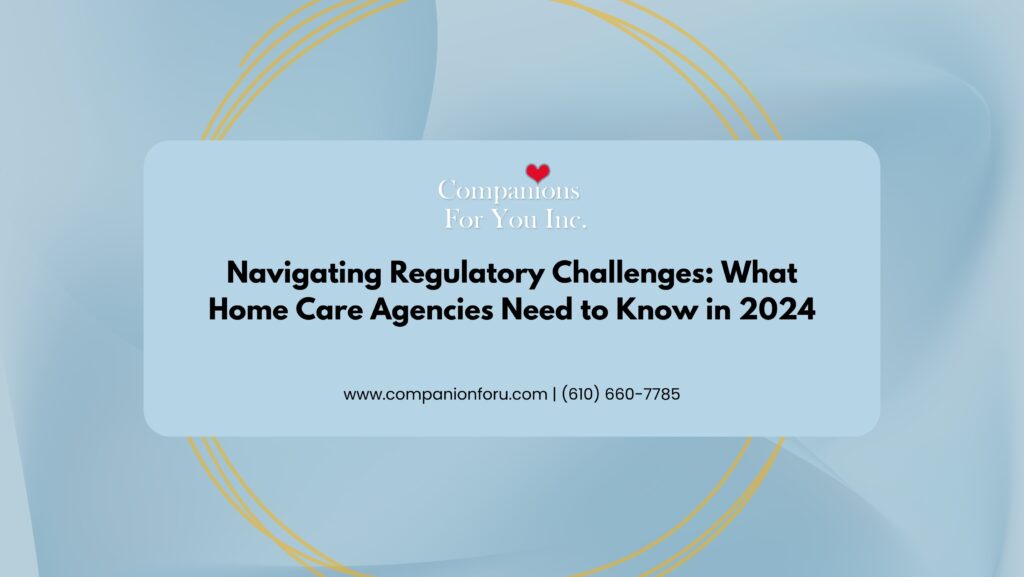The home care industry is subject to a complex web of regulations that ensure the safety and well-being of clients. However, navigating these regulatory challenges can be daunting for home care agencies. In 2024, several key regulatory updates are set to impact the industry. This blog will explore these changes and provide practical advice on how home care agencies can stay compliant while continuing to deliver high-quality care.
Understanding the Regulatory Landscape
Home care agencies operate under various state and federal regulations that govern everything from caregiver qualifications to billing practices. Key regulatory bodies include the Centers for Medicare & Medicaid Services (CMS) and state health departments. Understanding the regulatory landscape is crucial for ensuring compliance and avoiding penalties.
Key Regulatory Changes in 2024
Several significant regulatory changes are expected to impact home care agencies in 2024:
- Electronic Visit Verification (EVV): Starting in 2024, EVV requirements for skilled home care services will be implemented. Agencies must use electronic systems to verify that care visits occur as scheduled, ensuring accountability and reducing fraud.
- Medicare and Medicaid Reimbursement: Changes in reimbursement rates and requirements from Medicare and Medicaid will affect how home care agencies bill for services. It’s essential to stay updated on these changes to ensure accurate billing and reimbursement.
- Licensure and Certification: New licensure and certification standards for caregivers are being introduced to ensure higher quality of care. Agencies will need to ensure that all caregivers meet these new standards and receive ongoing training.
- Data Privacy and Security: With the increasing use of technology in home care, data privacy and security regulations are becoming more stringent. Agencies must implement robust data protection measures to comply with regulations like HIPAA.
Strategies for Staying Compliant
Staying compliant with regulatory changes requires a proactive approach. Here are some strategies to help home care agencies navigate the regulatory landscape:
- Regular Training and Education: Provide ongoing training for caregivers and administrative staff to ensure they understand the latest regulations and compliance requirements. This includes training on new technologies like EVV systems.
- Implementing Technology Solutions: Use technology to streamline compliance processes. For example, EVV systems can help ensure that visits are accurately recorded, while billing software can help manage reimbursement claims.
- Conducting Regular Audits: Regular internal audits can help identify potential compliance issues before they become major problems. Audits should include reviewing care documentation, billing records, and data security measures.
- Engaging with Regulatory Bodies: Maintain open communication with regulatory bodies like CMS and state health departments. Staying informed about upcoming changes and seeking clarification when needed can help ensure compliance.
Companions For You Inc.: Committed to Compliance
At Companions For You Inc., we are dedicated to maintaining the highest standards of compliance. Our commitment to staying abreast of regulatory changes ensures that we provide safe, reliable, and high-quality care to our clients. Visit our In-Home Care page to learn more about our compliance initiatives and how we ensure the well-being of our clients.
Challenges and Solutions
Navigating regulatory challenges is not without its difficulties. Here are some common challenges and solutions:
- Keeping Up with Changes: Regulatory updates can be frequent and complex. Agencies should designate a compliance officer or team responsible for monitoring and implementing regulatory changes.
- Resource Allocation: Compliance efforts can require significant resources. Investing in technology and training can help streamline compliance processes and reduce the burden on staff.
- Balancing Care and Compliance: Ensuring compliance should not come at the expense of quality care. Agencies must find a balance between meeting regulatory requirements and providing personalized, compassionate care to clients.
Conclusion
Navigating regulatory challenges is a critical aspect of operating a home care agency. By staying informed about changes, investing in training and technology, and conducting regular audits, agencies can ensure compliance and continue to provide high-quality care. At Companions For You Inc., we are committed to upholding the highest standards of compliance to ensure the best outcomes for our clients.For more information on how we stay compliant with regulatory changes, visit our Google Business Profile.

